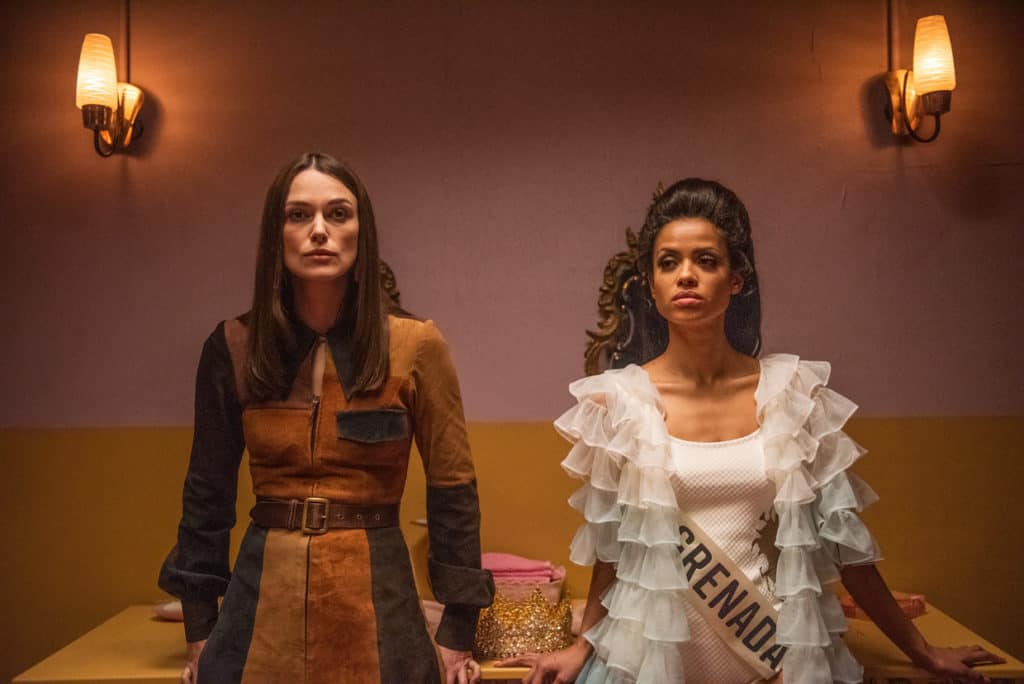Moviegoer: Misbehaviour

The Miss World competition is rocked by changing times in this light comedy
By Diana Beechener
In 1970, Sally Alexander (Keira Knightley: The Aftermath) is just hoping for a place at the table. Interviewing for a position at University College London, Sally wants to complete her degree and one day become a history professor. She’s got plenty of ideas for research, but the panel of male interviewers just want to know what her husband thinks about her taking time away from household duties.
Tired of men telling her she should settle down and focus on raising her child, Sally joins the Women’s Liberation Movement. She and her fellow feminists are hoping to tear down the patriarchy and create a world where women can choose to pursue higher education whether or not men think they ought to.
There’s just one problem – no one cares about the Women’s Liberation Movement.
With the papers filled with stories of global turmoil and Londoners protesting apartheid, the WLM is having trouble getting their message heard by a large audience. Sally and her fellow feminist Jo Robinson (Jessie Buckley: I’m Thinking of Ending Things) develop a plan: If they protest the upcoming Miss World competition, they’re sure to make headlines.
Long viewed as a “cattle market” by feminist circles, The Miss World competition is still one of the most popular yearly events on television. With millions of global viewers, the competition seeks beauty from around the world. Feminists argue the competition is demeaning—the competitors are measured, weighed and made to parade around in their bathing suit. It’s also being hosted by notorious “benign misogynist” Bob Hope (Greg Kinnear: The Red Sea Diving Resort). With a plan set, the women prepare to make a statement the world can’t ignore.
In Grenada and South Africa, two women are hoping for a different seat at the table. Grenada contestant Jennifer Hosten (Gugu Mbatha-Raw: Summerland) is hoping to set her career up by placing well in a competition that’s never selected a non-white winner. Pearl Jansen (Loreece Harrison: Brave New World), is the first black contestant South Africa has ever sent to Miss World. Her entry in the competition is purely political as the Miss World organizers asked the country to send two contestants, one black and one white to avoid apartheid protestors. Pearl is given the title “Miss Africa South” and told that if she speaks about the injustices occurring in the country, she’ll never be allowed to return.
Will the WLM’s planned protest finally get the grievances of women on the international stage? And can Hosten and Jansen find a place at in a white-dominated pageant?
A film with lots of good ideas and little follow-through, Misbehaviour is a pleasantly shallow romp through feminist history. Director Philippa Lowthorpe (The Crown) tries very hard to make a crowd-pleaser of a film. All the women are spunky and fun, all the misogyny they face is light-hearted enough not to seem insidious, and the movie ends with a wry note that the fight to stop the patriarchy is ongoing.
Lowthorpe has made a fine light movie, but the issues she raises don’t have light answers. This is a movie that would be a good introduction to feminist history for younger audiences and casual viewers. But the weakness of the film lies in her determination to tell too many stories. Alexander and Robinson’s protest is clearly the main story, but the film rightly brings up Hosten and Jansen’s barrier-breaking entry into the Miss World competition. Though Hosten brings up that the feminist movement has a history of only being interested in white women’s causes, the film falters in holding the movement truly accountable. Instead, Lowthorpe chooses to back off of controversial topics and celebrate women in general. Yes, Alexander and Hosten are at odds, but why choose a side when you can call them both heroes?
Though the film isn’t sure what it wants to say beyond women are great, patriarchy is bad, the charm of the lead performances makes Misbehaviour a fun romp through condensed feminist theory. Buckley especially shines as an anarchist who wants nothing more than to cause as much trouble as possible. She’s a wonderful foil to Knightley’s more stoic planner, gleefully spray-painting slogans and causing havoc where she can. Both Mbatha-Raw and Harrison shine as women trying to prove their worth in a competition that has largely ignored them. While other contestants throw fits and pout, they must maintain serene composure at all times. Any mistake has consequences far beyond a simple beauty pageant.
If you’re hoping to get your family interested in the women’s movement, Misbehaviour would be an excellent stepping stone. A light-hearted look at how far we have (and haven’t) come as a society, Misbehaviour will encourage young ones to fight for their dreams.
Fair Dramedy * NR * 106 mins.
